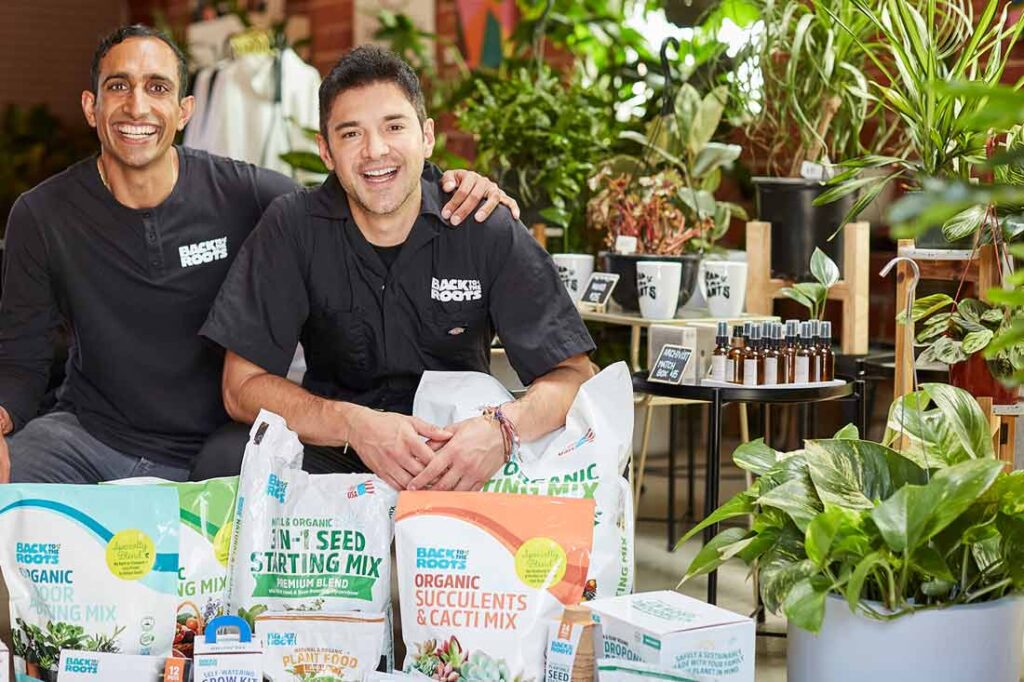In a fast-moving digital world, there’s something intrinsically healing about the slowing down that gardening requires. The feeling of dirt under our nails, watering and watching something grow; the patience, the practice, the stilling of the mind. It’s no wonder that gardening and happiness go hand in hand. In fact, simply breathing in Mycobacterium vaccae, a naturally-occuring bacteria that lives in soil, can reduce anxiety and increase levels of serotonin.
For the team at organic food and gardening company Back to the Roots, gardening is the ultimate unifier; it connects people and communities back to the land and back to themselves. Today, the Oakland, California-based B corporation is the fastest-growing gardening company in America, with products available at more than 10,000 stores nationwide, including Walmart, Target, The Home Depot, Whole Foods and more.
The seed that started Back to the Roots
What is now a $100 million business reaching thousands of families and individuals each year started as all great ideas do: with a single seed of inspiration. Back in 2009, Nikhil Arora and Alejandro Vélez were seniors in their last semester at UC Berkeley. With Arora going into consulting and Vélez primed for a career in investment banking, the two had never crossed paths. Then, just shy of graduation, both men sat in on the same business ethics lecture on sustainability among more than 200 other students.
When the professor mentioned how gourmet mushrooms can grow off of spent coffee grounds, a spark of curiosity was lit in both their minds. Unbeknownst to the other, they both emailed the professor after class asking for more information about these mushrooms. As Arora recounts, “The professor told me that he didn’t remember where he first read about the mushrooms but that another student had asked him the same thing, and suggested that we link up.”
They did just that. Before long, the duo began swapping finance books for mycology books, searching YouTube videos on how to grow mushrooms and turning Vélez’s fraternity kitchen into a mini science lab. After growing a few test buckets, they received some local support from restaurant owner and pioneer of the farm-to-table movement, Alice Waters, who loved the taste of their mushrooms. Then, two weeks shy of graduation, Arora and Vélez received a $5,000 grant from their chancellor.
Getting the community involved
In the early days, Arora and Vélez focused on learning, experimenting and connecting with their local community. “We’d wake up at 5 a.m. every day and collect coffee ground waste from cafes to upcycle and use to grow fresh mushrooms,” Arora recounts. When they weren’t farming, the founders held demos and led tours for schools and families at their early mushroom farms in Oakland. “We started noticing that there’s a big pendulum swing between how our grandparents were so connected to where their food came from compared to how we are today, especially in urban settings and urban schools,” Arora explains. He notes that many kids see their food as coming from a truck or a grocery store, rather than from the ground.
Aside from growing mushrooms themselves, Arora and Vélez enjoyed sharing their process with others and inspiring them to do the same. The first Back to the Roots product was a grow-at-home mushroom garden kit that allows anyone to grow up to a pound of pearl oyster mushrooms indoors in as little as ten days. It’s completely foolproof: you simply open the box, spray it twice daily with the included mister and watch the mushrooms grow bigger and bigger until they’re ready to be plucked and plated. “We wanted to teach people everywhere across the country how to grow their own food,” Arora adds.
Building the gardening brand
After the success of their mushroom kit, Back to the Roots began selling hydroponics, microgreens, windowsill planters and other indoor gardening essentials. Most recently, they’ve expanded to include outdoor gardening items such as raised beds and planters, live seedlings, soils and plant foods. Before Back to the Roots, the process for starting a garden was complicated: you needed to buy seeds from one company, pots from another and plants from somebody else. “Our big unlock was making organic gardening more accessible and easy,” Arora says. This meant offering the same accessibility and ease with growing an outdoor garden as they did with indoor gardening. “It was important that we maintained the same brand promise: for them to go from seed to soil to fertilizer,” he adds.
Transitioning from an indoor gardening kit company to a gardening brand was a natural progression based on where their growers were headed. At the beginning of the company’s journey, the majority of people turning to Back to the Roots were folks who hadn’t grown food or gardened before, whereas now, a lot of customers are new or soon-to-be homeowners.
This next cohort, which includes millennials, are typically working with more space, whether a patio or outdoor area where they can create their own garden. “Expanding our business to include outdoor gardening meant maintaining the same brand promise to our customers. For them to be able to buy everything they need in one place and know that it’s high-quality and affordable has really led to incredible growth,” notes Arora.
Celebrity endorsement
It’s not only new homeowners looking to boost their gardening game. Celebrities have joined the movement, too. Back to the Roots added Ayesha Curry to its board of directors and counts Gabrielle Union and Alyssa Milano as investors. Much like the evolution of their business, these relationships grew organically. As Arora puts it, Steph Curry is a fellow Oakland resident, foodie and gardener, and Milano is a huge gardener who is passionate about homesteading and teaching her family about food.
In the case of Union, the Back to the Roots founders met her mostly by chance but soon bonded over a shared passion for sustainability. “We first met during an Amazon Live feature—it was just a five- to 10-minute conversation, but we immediately hit it off around our shared passions for sustainability,” Arora recalls. “She’s building out a farm and wants to help reconnect folks with the land. We continued talking afterwards and it blossomed into an exciting partnership.”
Keeping sustainability top-of-mind
Reflecting on their journey and how far they’ve come, Arora sees how connection to food is both communal and personal. “It’s hard to pinpoint why we both first raised our hands in class for more information, but for me it was definitely something around the sustainability side of growing food from waste, and for Alejandro, perhaps it was the connection to coffee culture that tied so deeply into his Colombian roots and the educational opportunity around it,” he says.
It’s this tie to food and sustainability that continues to resonate with so many people across the nation. A great example is Back to the Roots’ #GrowOneGiveOne campaign: Every time a customer shares their growing journey on social media using the hashtag, the company donates a gardening kit and curriculum to an elementary school classroom of the person’s choice. Last year alone, this initiative reached 60,000 children. “We aim to be that spark of curiosity—just like growing that first mushroom was for us—that helps them reconnect and ultimately change the food system,” Arora explains.
Today, Back to the Roots’ organic, all-purpose potting mix is one of the most affordable on the market. “It’s so exciting to make organic soil and be the best value for quality and price. It’s just a huge opportunity to change the food system,” Arora says. Even so, he believes that gardening is not about how many pounds of tomatoes you can grow or how cheaply you can do so—rather, the value is in the joy and connection you feel to the earth, your food and each other.











